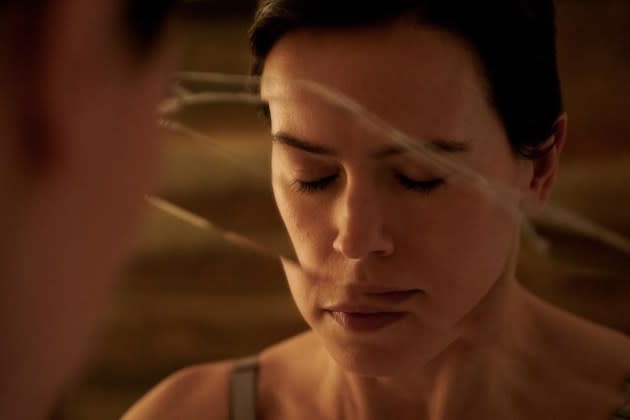‘Magpie’ Review: Daisy Ridley Stars in a Marital Noir That Never Heats Up

Magpie revolves around a toxic heterosexual marriage dynamic you’ve certainly seen a thousand times before, if not in real life then at least in pop culture. Annette (Daisy Ridley) is the long-suffering wife, who’s sacrificed her career to cook and clean and raise children for an ungrateful man. Ben (Shazad Latif) is that ungrateful man, who seems to notice Annette only when he’s ticked off with her.
When a glamorous actress (Matilda Lutz’s Alicia) enters their lives via a movie role for their daughter (Hiba Ahmed’s Tilly), it’s practically a foregone conclusion that Ben will further neglect Annette in favor of this shiny new romance. The big question, then, is what Annette might do — what a woman already on the edge might prove capable of once she’s pushed. But despite a juicy hook built on heated emotions and drastic actions, Magpie proves too cold and ultimately too timid to spark much of a reaction.
More from The Hollywood Reporter
Much of the issue lies in Magpie‘s tendency to reach for the generic over the specific. So Ben is not merely a selfish jerk but the most selfish jerk imaginable: When Ben and Annette’s baby starts crying, his reflexive response is to turn to Annette with an irritated “Shouldn’t you —?” When Tilly accidentally lets slip to her mother that he and Alicia have been hanging out, he fixes the little girl with a glare and hisses “Well done.” With neither the charm to position himself as a fun villain nor the relatability to position himself as a flawed everyman, Ben is so easy to loathe that loathing him isn’t even that fun.
Likewise, Alicia is presented not as a woman on her own journey but as a symbolic ideal for Ben to project his aspirations onto, or for Annette to compare herself against. As Ben and Alicia’s flirtation heats up over text, Alicia is increasingly portrayed not as herself but as Ben’s fantasy of her, director Sam Yates’ camera zooming in on her smile as she coos sweet nothings under a dreamy glow.
This leaves only Annette to navigate Magpie‘s deeper psychological waters, with mixed results. On one hand, Ridley is adept at flipping between the almost saintly patience Annette shows Ben and Tilly and the mounting pressure she experiences in private. Meanwhile, Isobel Waller-Bridge’s noirish score and Dan Morgan’s purposefully discordant sound design hint at darker impulses. In one evocative sequence, Annette hears her baby’s wails echoed in the baby monitor she holds in her hand. Rather than go to him, she impulsively runs from the family’s immaculate countryside home until the monitor has fallen silent and out of range. Then, after catching her breath, she walks slowly back. There’s nothing for her to do but to go back once more and try to bear the unbearable.
If we understand Annette perfectly well as an unhappy wife and mother, however, the deeper hows and whys of her life are left unexplored. Tom Bateman’s screenplay does not let on what Annette ever saw in Ben, what she stands to lose if he leaves, what she hopes might happen instead. Even the scenes of Annette apparently cracking under pressure — like the moment described above, or others when she grips a mirror until it shatters or slams her phone into the counter until it breaks — feel as though they could come from any script about a frustrated wife; there’s little about them that registers as notably odd or specific to this individual. The opacity appears on some level to be intentional, meant to preserve the surprises of the third act. But the choice robs Magpie of basic emotional stakes. We’re left to wonder who Annette even is beyond a vague representation of every wronged woman.
Worse, when the movie finally shows its cards, its hand proves underwhelming — the entire thing rests on a twist that’s not very difficult to guess, but that nevertheless gets a whole Saltburn-style ending montage in case you weren’t paying attention. Meanwhile, though the narrative is ostensibly driven by big feelings and outrageous choices, the film finds neither earnest pathos nor nasty thrills in Annette and Ben’s predicament. I longed for more sex, more violence, more messiness — more anything to provoke a reaction, to delight me or confuse me or piss me off. Annette’s outward placidity is a mask, meant to cover up the intense emotions raging within. Magpie‘s is just a reflection of the hollowness underneath. Despite the rage and sorrow coursing through the veins of the plot, the thriller struggles to get its pulse up.
Best of The Hollywood Reporter

 Yahoo News
Yahoo News 